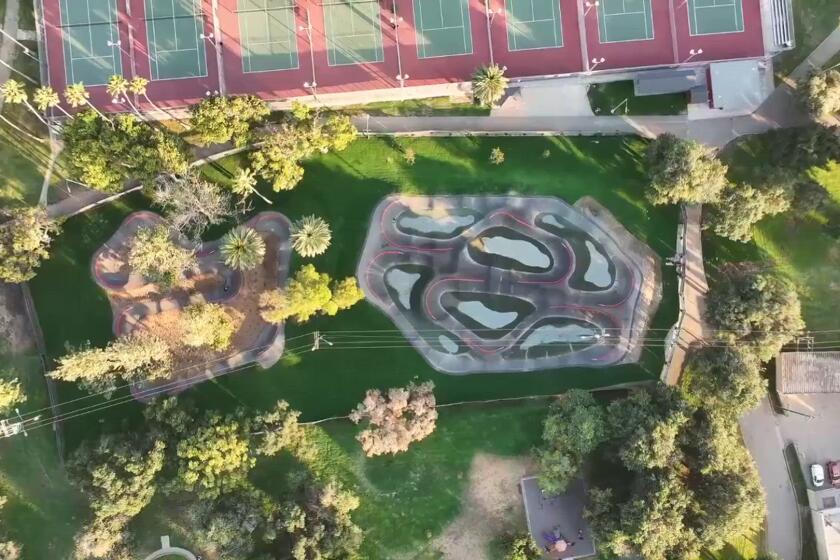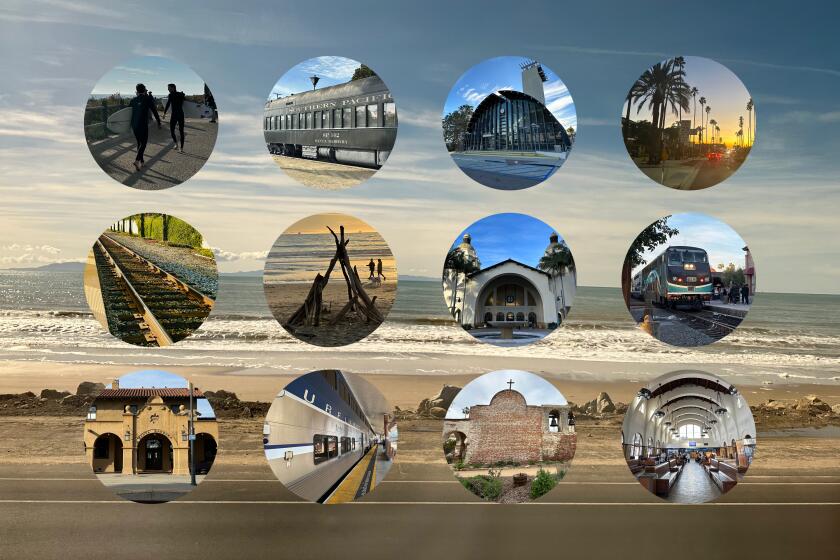(Brand name) here, there, everywhere
Anyone who’s seen “Idiocracy,” the 2006 cult comedy set 500 years in the future when even announcements from the State Department are “brought to you by Carl’s Jr.,” won’t be surprised by a recent civic trend. In cities all over the country, public spaces — from bridges to state parks to school auditoriums — are being offered up and sold as advertising space.
A subway stop in Brooklyn is now “sponsored” by Barclays PLC, which will display its name on the platform. In Philadelphia, $3 million was enough to turn the Pattison Avenue train terminus into AT&T Station. Trail markers in some public parks in Virginia and Maryland include logos for North Face. Here in California, Coca-Cola mounted a logo at Cuyamaca Rancho State Park after it planted trees that were destroyed by wildfires.
We’re accustomed to such behavior in the nonprofit world, where the walls of museums and concert halls are etched with the names of the philanthropists and the corporations that endow them. Despite scoffing in some corners, the Earth didn’t stop turning in 2008 when the New York Public Library thanked a $100-million donor by renaming its historic Fifth Avenue main branch the Stephen A. Schwarzman Building. As for L.A.’s very own Walt Disney Concert Hall, the Ron Burkle-Ralphs/Food 4 Less Foundation Auditorium may not have the most elegant ring to it, but the show goes on (actually the show might not go on without it).
But playgrounds? State parks? Does the sudden appearance of Juicy Juice in such places portend a bleak, dystopian not-too-distant future? It’s easy to think so. Just as “Idiocracy” envisioned a world where a Costco store is as large as a city and water has been replaced by a Gatorade-like beverage called Brawndo, we may one day find ourselves standing at the Occidental Petroleum bus stop, boarding the Wells Fargo Limited and waiting impatiently at Dial-a-Mattress traffic lights. Maybe we’ll vacation at the Gap Gulch, formerly known as the Grand Canyon. Maybe we’ll go surfing in the Pfizer Pharmaceutical ocean. Maybe we’ll breathe the Halliburton air. The possibilities are endless!
If that sounds fatuous, it’s because slippery-slope arguments usually are. Then again, a contingent of people are taking all this a step further by selling ad space on their bodies. Five years ago, a Salt Lake City woman named Karolyne Smith received $10,000 from the Golden Palace online casino to permanently tattoo its name on her forehead. Imitators soon followed, though most were only in the market for temporary tattoos.
Ask these folks why they’re willing to turn their bodies into human billboards (in Smith’s case for around the price of a used car) and the answers run along the same lines: Times are hard, families must be fed, and, hey, is this not a shining example of American ingenuity at work?
“It’s a small sacrifice to build a better future for my son,” Smith said. “To me, $10,000 is like $1 million.”
Before we get all judgmental (do as I say, not as I do, readers), we should probably consider just how universal such “ingenuity” has become. Government leaders, for example, are looking for money anywhere. Recent legislative efforts to legalize pot and gambling and loosen restrictions on Sunday alcohol sales didn’t come about because lawmakers wanted to appear less square. They came about because economic hard times forced states to adjust their values. Amid the rough seas of budget crises, the social vices that lawmakers once scorned suddenly looked like life rafts.
Granted, most hikers would probably prefer their trails (if not their down vests) unbranded, but until some better ideas are put forth, decision makers will probably be a little less prudish about the avenues they take to fill their coffers. As a city official in Boulder, Colo., told the Wall Street Journal, “[If] someone … said ‘Here’s $4 million; we want to rename [your playground] the Pepsi Center,’ that would be very hard for us to turn away in this economy.”
In the short term, the innocent children of Boulder will probably not be irrevocably damaged if their monkey bars are made possible by a grant from a purveyor of high-fructose corn syrup. But if this trend continues for another 500 years, and Carl’s Jr. is indeed underwriting government addresses, we may have no choice but to expand ad space into outer space. Sure, if there are life forms on other planets, they may be irked. But if it gets them to come to our casinos, it’ll be worth it.
Sign up for The Wild
We’ll help you find the best places to hike, bike and run, as well as the perfect silent spots for meditation and yoga.
You may occasionally receive promotional content from the Los Angeles Times.




